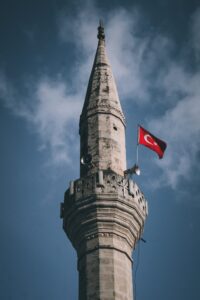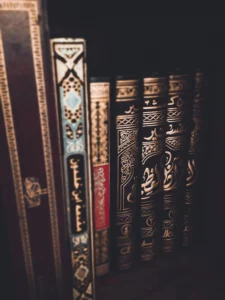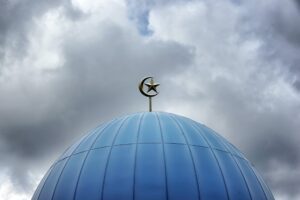Our February colloquium featured Dr. Adeel Malik, a development macroeconomist at the University of Oxford, who delivered a presentation on the prospects of ummatic economic unity. Dr. Malik began his talk by addressing the significant economic fragmentation within the Muslim world and emphasized the necessity of examining this ongoing challenge through a historical inquiry into the moral economy of Islam.
Beginning with the centrality of economics to the ummatic experience, Dr. Malik highlights the concept of economic solidarity as a feature of a broader, monotheistic moral solidarity. This moral solidarity, while primarily concerning Muslims and their societies, also offers a model for broader human exchange.
A key concept in the Islamic moral economy, according to Dr. Malik, is that of “circulation,” which he says reflects an interconnectedness in both economic exchange and the divine order. In this regard, he identifies two elements of exchange: the visible, encompassing open trade among people, and the invisible, involving spiritual exchanges with God. Islamic acts of trade and charity, therefore, are not peripheral but central to understanding the moral economy of Islam, as they represent a part of the divinely sanctioned system of circulation. This is because the Islamic moral economy fosters a holistic worldview, contrasting with the zero-sum perspective of modern capitalism, where some gain at the expense of others. Instead, Islam promotes investment in the prosperity of others and the community at large, fostering a collective sense of well-being.
Providing a historical perspective, Dr. Malik notes that before Islam, economic security was virtually nonexistent, with theft and robbery being rampant. The polytheistic order preceding Islam was not only about idol worship; it involved a political economy rooted in clan tensions and power struggles, lacking an open-access order. Islam disrupted this equilibrium, presenting a new market vision based on monotheism.
This, for Dr. Malik, stands to demonstrate how political integration is intrinsically linked to economic integration, since Islam’s advent introduced a moral order that reorganized trade and exchange practices, creating a new form of moral solidarity intertwined with social justice. The current economic disunity in the Muslim world therefore reflects fragmented political landscapes where different polities maintain separate economic sections, reinforcing political disunity, not unlike pre-Islamic Arabia.
Islam can remedy this state of affairs in its emphasis on two key market features: autonomy and participation. Unlike pre-Islamic markets, Islam opened the market to everyone, aiming to create a divine order of circulation. This economy of solidarity became a fundamental feature of Islamic civilization, and can today, if properly pursued, unify diverse communities into an ummatic order.
Dr. Malik concluded his talk with a discussion of three major challenges in the current economic order: a toxic discourse on trade, xenophobic nationalism, and egregious inequality. The toxic trade discourse is rooted in zero-sum understandings of exchange, xenophobic nationalism hinders the resurgence of a shared moral economy, and egregious inequality highlights the increasing gap between the rich and the poor. Dr. Malik emphasized that discussions about the Umma are incomplete without considering ongoing economic, trade, and community vision issues such as these. Integrated markets, he says, have the potential to transform the current geopolitical landscape, challenging the centralization of capitalistic power and fostering new opportunities for the Umma.
Dr. Malik therefore stresses the need for a new economic and geopolitical vision to address current challenges and pave the way for ummatic unity. This new vision would challenge existing power structures and create opportunities for a more unified and prosperous Muslim world.



